|
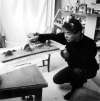  
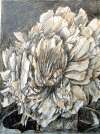 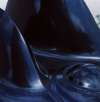 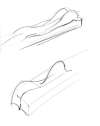
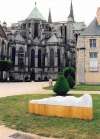 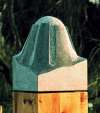 
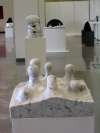 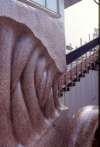 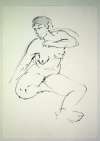
|
> It seems that to you, everything
is alive.
_ Everything that exists, that has a shape, is alive and
has a spirit: animals, plants, minerals, air, water.
Everything that lives will die. Yes, maybe it’s a Shintoist
vision of the world.
> You attack the stone, is it
to wake it up ?
_ Yes it is true, I battle with the stone. I put my life
in the material.
> How does your spirit and the
spirit of the stone cohabit together in the stone ?
- It’s natural for me...
> At what point does a sculpture
work ?
_ If something emanates from the sculpture, a feeling,
a sensation, an expression, a spirit; if the sculpture
makes you dream and travel, then it works.
> あなたの目にとっては、すべてが生きているようですね。
_ この世に存在、形を持つものすべてが生命、精神を持つと言います。動物、植物、鉱物、空気、水。生きているすべての物は、何時か死にます。はい、多分、それは神道の見方かもしれません。
> あなたは石を攻めていますね。それは石を目覚めさせる為ですか
?
_ はい、本当です。私は石と戦います。私の魂を素材の中に入れます。
> どうやったら、 あなたの精神と石の精神とが一緒に石の中に宿る事が出来るのですか?
_ それは、私にとってごく当然の事です。
> どんな時、彫刻が巧く行くのですか ?
_ もし一つの作品が感性、感情、表現、精神を放ち、それが夢を見させてくれたり、旅させてくれたりするならその作品は巧く行った事に成ります。
> On
dirait qu’à tes yeux, tout est vivant.
_ Tout ce qui a une forme a un esprit et est vivant : l’animal,
le végétal, le minéral, l’air, l’eau. Tout ce qui vit
mourra. Oui, c’est peut-être une vision shinto du monde.
> Tu
attaques la pierre, c’est pour la réveiller ?
_ Oui c’est vrai, je bataille avec la pierre. Je mets de
ma vie dans la matière.
> Comment font ton esprit et celui
de la pierre pour cohabiter ensemble dans la pierre ?
_ C’est naturel pour moi...
> À quel moment une sculpture
fonctionne-t-elle ?
_ Si une sculpture dégage une sensation, un sentiment,
une expression, un esprit, si elle fait voyager, rêver,
alors elle fonctionne. |
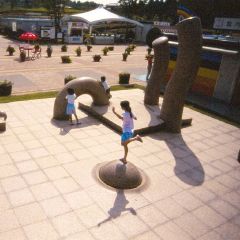 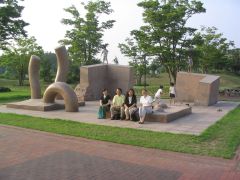 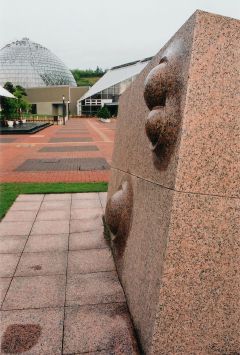 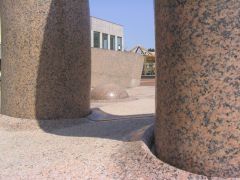
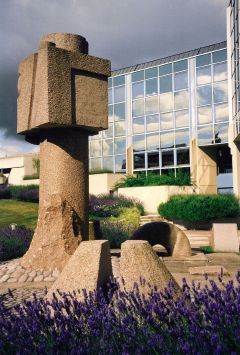 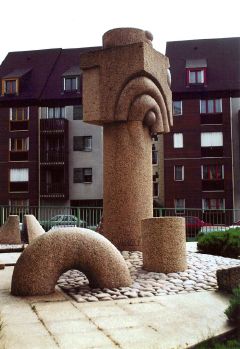
|
> The fact that such
a violent technique may produce such a soft shape impresses
me.
_ I see what’s waiting for me inside the block, inside the
material. It is not an assembly work, collage or clay modelling,
it is sculpting: you are taking away matter.
I have no anger when I work, I respect, I release the shape,
I must not take off too much, I work step by step, I question
the shape. “Is this what I want to express ?” I have to know
when to stop, when the shape is revealed. Violence does not
give birth to a soft shape.
> そのようなとても激しいテクニックが、結果的に非常に柔らかい形に結びつくと言うのは驚きです。
_ 私は、石や素材の中に、私を待っているものを感じます。それは塑像や組み合わせの構成と違って、素材を取り去って行く事です。彫っているときは、激しさはありません。素材を尊重し、内に秘められた形を出して行きます。彫り過ぎてもいけません。少しずつ削ります。そして「本当に自分が言いたいのは此れなのか」と言う問いを形に投げかけます。自分の望む形が現れた時には、彫る事を止めなければなりません。激しさは、流れるような形を誕生させません。
> Le
fait qu’une technique aussi violente aboutisse à forme très
douce m’impressionne.
_ Je vois ce qui m’attend à l’intérieur de la pierre, de
la matière.
Ce n’est pas de l’assemblage ou du modelage, on retire
de la matière.
Je n’ai pas de rage quand je travaille, je respecte, je
dégage la forme, il ne faut pas retirer trop, on avance
petit à petit, on interroge la forme, « est-ce bien ça
que je veux dire ? »
Et il faut savoir s’arrêter quand la forme est là. La violence
ne fait pas naître une forme fluide.
> Your large scale
pieces are motionless and they are designed for a particular
context. Do your smaller and mobile pieces require
ephemeral scenographies ?
_ This piece is mostly for an indoor use. In general it’s
a question of scale. It is less the shape that the size
that matters. I want to play with formal and scale contrasts,
they are so many possibilities! I presented this white
work in a white space, a museum with a contemporary architecture,
it created a new atmosphere, very soft.
Actually, most of my works are exhibited in urban contexts.
I use “natural” shapes and materials, because I like the
idea of bringing a “natural” presence in an urban context.
> あなたのモニュメンタルな作品は移動しないですね。彼らは特定の場所のために設計された文脈を持っています。移動出来る作品、小さな作品の場合、一時的な空間構成を必要としますか
?
_ この作品は、むしろ屋内向けでしょう。普通、それは大きさの問題ですが。形の問題よりどちらかと言うとサイズの問題でしょう。形やサイズでコントラストを付けるには、無限の可能性があります。この白い作品は現代建築美術館の中の、白い壁の空間に展示しましたが、とても柔らかい、新しい雰囲気を生み出す事が出来ました。
実際私の多くの作品は、都市空間に設置されています。「自然」の素材と形を使って、「自然なオブジェ」を都市空間に持ち込むと言う考えが私は好きです。
> Tes pièces de grande taille sont immobiles et contextuelles
destinées à un lieu déterminé. Tes pièces mobiles, de petite
tailles exigent-elles des scénographies éphémères ?
_ Cette pièce est plutôt destinée à un usage en intérieur.
En général c’est une question de rapport d’échelle, pas
tellement la forme mais plutôt la taille de la sculpture.
J’ai envie de jouer sur des contrastes formels et d’échelle,
il y a tellement de possibilités ! J’ai exposé cette sculpture
blanche dans un espace blanc, dans un musée à l’architecture
contemporaine, ça a produit une atmosphère nouvelle, très
douce.
En réalité la plupart de mes oeuvres sont exposées dans
un cadre urbain. J’utilise des matériaux et des formes
«naturelles», l’idée d’apporter un «objet naturel» dans
un cadre urbain me plaît.
|

|
_ Here it looks like a wave but I wanted
to suggest a fertilized woman, like a flower, a corolla,
protected, delicacy, softness.
_ The colour of a material
is very important. For example I love to work with pink
on large sculptures in the city to express softness. These
days I work a lot with black for small pieces expressing
power.
_ それは波の様に見えるかもしれませんが、 花、包み込むような花冠、繊細さ、柔らかといった、身ごもった女性をほのめかそうとしたのです。
_ 素材の色がとても大切な様に、例えば、ピンクの御影石は都市空間に柔軟さを与えてくれるからとても気に入っています。最近は、力強さを表現するのに、小型作品には黒御影石をよく使っています。
_
Là ça ressemble à une vague, mais en fait j’ai voulu suggérer
une femme fécondée, comme une fleur, une corolle protégée,
la délicatesse, la douceur.
_
La couleur du matériau est très importante, par exemple
j’aime bien travailler le rose en grand dans la ville pour
apporter de la douceur. En ce moment, j’utilise aussi beaucoup
le noir pour des petites pièces qui expriment la force.
|
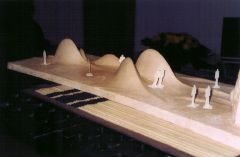 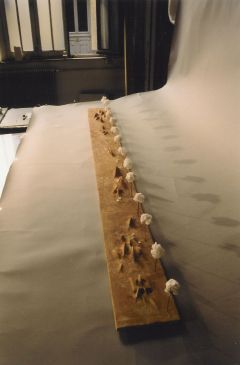
|
> This is an unrealised
project for the “Big Swan” stadium in Niigata.
_ It is an undulation, in front of the entrance to the stadium,
parallel to the canal. It’s a sculpture 3-4 meters high that
you cross to the paving
becomes the sculpture, the ground rises, undulates into verticality.
>これは実現しなかった、新潟の「ビッグ
スワン」スタジアムのためのプロジェクトです。
_ スタジアムの入口の前を流れる運河と並行している波動を表わす彫刻です。この作品は交差する高さ3-4メートルで、垂直方向に波打つ敷石が彫刻になります。
>C'est un projet pour le stade du mondial de football à Nigata
nommé "BigSwan".
_C'est une ondulation, parallèle au canal, en face de l'entrée
du stade, C'est une scultpure à traverser de 3 à 4 mètres
de haut, le dallage devient la sculpture, le sol devient
vertical, ondule,
|
 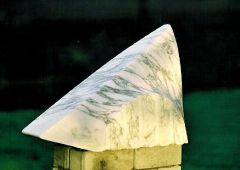 |
> What are the common
points between these two sculptures ?
_ They are very different: the white one is an iceberg
that floats peacefully, the black one is a young volcanic
mountain.
>この2つの彫刻の間の共通点は、何ですか
?
_ この二つは非常に異なります。白い作品は軽やかに浮く氷山で、黒い方は若く力強い火山です。
> En quoi
ces deux sculptures sont-elles similaires ?
_ Elles sont différentes : la blanche est un iceberg qui
flotte légèrement, la noire est une jeune montagne volcanique
|
|
|
|
|